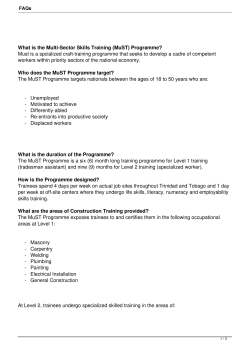
Online SPS Training Programme for Pakistan Project Initiation Document
Online SPS Training Programme for Pakistan Partnership to Deliver International Online SPS Training Program for Pakistan Project Initiation Document Project Executive: Elizabeth Dodsworth Project Manager: Mahrukh Siraj Date: 16/08/11 PID Version: May 2011 Part A – Background (1) Executive Summary & Objectives Executive Summary This scope of work establishes an agreement between CABI and USDA to facilitate capacity building efforts in Pakistan’s animal and plant health regulatory systems, including sanitary and phyto-sanitary (SPS) issues. The following information defines initial steps in the collaboration between CABI and USDA. Through this agreement, USDA is providing CABI with initial funding to upgrade our facilities in Rawalpindi to deliver computer based animal and plant health training activities. The project will be implemented in close collaboration with USDA, a U.S. university consortium led by Texas A&M University, and relevant government authorities in Pakistan. Project Objectives • To increase the SPS capacity of Pakistan’s regulatory and scientific officials • To support national agricultural production and trade objectives • To improve training infrastructure within CABI’s center in Pakistan to deliver e-learning/online trainings. Part A – Background (2) Key Stakeholders and Beneficiaries ● Stakeholders and Beneficiaries:● Donor(s): APHIS-USDA ● End-user(s): Government of Pakistan, Department of Agriculture, other related private/public sector organizations and universities ● Partner(s): US university consortium led by Texas Agrilife Research, Government of Pakistan ● CABI Centres/Departments: CABI CWA Part B – Implementation (1) Proposed Organisation Structure ● Corporate Management: ● Project Board:● Project Executive: Elizabeth Dodsworth ● Senior Users: Patricia Neenan ● Senior Suppliers: Rana Shafique ● Project Assurance: Patricia Neenan ● CABI Budget-holder: Mahrukh Siraj Note that, if not the Project Executive, the CABI Budget-holder must have written confirmation from the Project Executive, and the Project Manager if required by Project Executive, prior to authorising payment. ● Project Manager: Mahrukh Siraj ● Team Managers: IT officer, SPS Facilitator (TBI) Part B – Implementation (2) Stages Stages Work Packages / Deliverables in Stage, unless indicated in Stage Name Stage Completion Date 1) WP1: Refine the scope of work in consultation with USDA-APHIS WP2: Schedule and questions/checklists for the meetings with Provincial Agriculture Departments, Trade organizations and other related organizations in public and private sector 01/03/2012 2) Monitoring and Evaluation Plan 01/01/2012 3) 2 Workshops – course topic Identification 31/01/2012 4) Collation of knowledge from the consultants 15/02/2012 5) Infrastructure improvements 25/02/2012 Part B – Implementation (2) Stages Stages Work Packages / Deliverables in Stage, unless indicated in Stage Name Stage Completion Date 6) Initiate coordination meetings with line departments, trade organizations, academic institutions for nomination of trainees 15/03/2012 7) Translation of 6 e-learning courses to Urdu 15/06/2012 8) 6 Training courses conducted at CABI 15/08/2012 9) 5 Regional training workshops conducted 15/12/2012 10)Translation of 10 e-learning courses to Urdu 15/10/2013 11)10 Training courses conducted at CABI 15/12/2013 12)5 Regional training workshops conducted 15/12/2013 Part B – Implementation (2) Stages Stages Work Packages / Deliverables in Stage, unless indicated in Stage Name Stage Completion Date 13) Translation of 3 e-learning courses to Urdu 15/01/2014 14) 3 Training courses conducted at CABI 15/03/2014 15) Continue coordination meetings with line departments, trade organizations, academic institutions for trainee nomination throughout 2012, 2013 ending in 2014 15/03/2014 16) Feedback from trainees incorporated into courses (feedback obtained after each course module, total 19 stages repeated from 2012-2014) 15/04/2014 17) 2 Regional training workshops conducted 15/06/2014 18)Project close out reports/final outputs 31/08/2014 Part B – Implementation (3) CABI Resource Requirements Staff Time Required on Project (and/or role on project) (Indicate whether time is in Days or Months) Rana Shafique 30 days over 3 years Mahrukh Siraj 293 days over 3 years IT officer SPS facilitator 318 days over 3 years 375 days over 3 years Training/User support officer 209 days over 3 years Patricia Neenan 39 days over 3 years Admin officer 350 days over 3 years Zeeshan Butt 105 days over 3 years Part B – Implementation (4) Customer Acceptance Criteria Acceptance Criteria Target Measures Communication with client excellent USDA APHIS Regular formal and informal communication Infrastructure improvements meet the required standards Infrastructure in place so Ensure that procurement training delivered on and maintenance contracts time and with no are in place interruption of service Security is maximized and training is delivered on schedule All participants are able to complete the training successfully Ensure that all security measures are followed and that there a SOPs in place, carry out spot checks On campus training sessions are held on time and fully attended 40 trainees attend each on-campus training session Trainees are nominated and invited on time, and attend training. Physical arrangements exist to host them Part B – Implementation (4) Customer Acceptance Criteria Acceptance Criteria Target Measures Courses are available to All off campus and on the target trainees campus trainees have access to the training material Ensure the courses are available via the DVDs and/or the LMS Courses are available in Urdu and English Ensure the translation and associated development is done on time USDA-APHIS/Trainees Part B – Implementation (5) Project Exclusions & Interfaces Exclusions ● Collaborators have separate contracts and are excluded from budget Interfaces ● ● ● Potential to use new facilities in other online training initiatives SPS is a key area of activity for CABI Interaction with Provincial Departments of Agriculture and their line departments, academic institutions and other related organizations in public and private sector. Part B – Implementation (6) Key Constraints & Assumptions Constraints ● ● Overheads were negotiated and are not as high as usual for KM projects Political instability and security risks in the country make field travel for dangerous and difficult for conducting regional trainings and coordination. Assumptions ● ● ● ● ● ● New ICTs equipment and facilities will provide venue for new training initiatives with the donor Human and financial resources are in place & available on time Sustained interest in coordination with attached departments by provincial MinFA /Agriculture Departments Govt departments allow participation of their staff in the training ICT services remain inexpensive and therefore accessible to all The development costs are based on an assumption that most of the modules will not require the screen text to be translated Part C – Reasons for CABI (1) Key Business Benefits - Strategic ● A key partnership with USDA APHIS, extending CABI’s range of activities ● Leverages on CABI’s regional centre structure ● Upgrades training and ICT infrastructure including multimedia training hall (GBP 25k approx..), though without any significant maintenance costs for the equipment beyond the project. ● Upgrades/builds capacity to develop and deliver elearning/distance learning training (the courses will be translated into Urdu) Part C – Reasons for CABI (1) Key Business Benefits – Strategic …continued ● Upgrades gate security (barrier + guard room) and provides for sound proofing of the training hall (GBP 8.9k approx) ● Introduces a new revenue stream of opportunity through ICT based distance learning ● Using CABI allows US funding agencies to safely and securely implement projects in Pakistan Part C – Reasons for CABI (2) Key Business Benefits – Financial (1) DONOR-FUNDED PROJECTS Full Project Budget – Planned Comments Donor Currency: US$ Exchange Rate to £: 1.65 Overall Contract Value in £ (if known): £577,358 USDA has deducted $5k from the overall contract value to pay for some internal FAS (Foreign Agriculture Service) admin fees. The change has been incorporated in the budget and the PID. The overall contract amount is less by £3002 now. Costs Billed to Project Donor (£) Gross Income: £577,358 Payments to External Collaborators: 0 Net Income: £577,358 CABI Implementation Costs (£) CABI Staff Costs: £129,397 Direct Costs: £351,735 (other direct costs, for example travel, etc) Net Profit/Loss (Project Contribution): £96,226 Net Project Contribution (%): 16.67% Note that the financials should match the information in the Project Financial Analysis (PFA) form. Part C – Reasons for CABI (3/4) Key Business Benefits – Opportunities for … Content for Plantwise An e-learning course will be developed on plant and animal SPS issues. This course can be used as training material by the plant doctors and beneficiaries of the Plantwise programme. Sponsorship or Distribution of CABI Products Product(s) Sponsorship Value (£) End-User Group Duration of Access Additional Information Part D – Risks (1) Key Risks Risk Owner Likelihood (L) (1=Low; 3=High) Impact (I) (1=Low; 3=High) Total (L x I) (1=Low; 9=High) Management Strategy (Prevention, Reduction, Contingency, Transference, Acceptance - and give brief description of how applied) In case the ‘ text on screen’ of the learning modules needs to translated the costs for translation will become high PM 1 3 3 Reduction: There will be minimal use of text on screen and more reliance on voice overs. Test with target audience to check comprehension of the English text. Lack of interest of the relevant departments in contributing to selection of topics for e-learning PM 1 2 2 Reduction: Convince them that the end result of the trainings would lead to SPS related awareness in their departments and directly affect exports. Involve other stakeholders from private and public sector. Political instability and security risks in the country make field travel dangerous/difficult PB 2 3 6 Contingency: try and conduct phone interviews . Conduct the training via internet using the VC equipment. Specialized training to narrow audience will limit risks associated with US funding CABI is seen as an instrument of the USAID PB 1 3 6 Acceptance; keep USDA branding subtle, promote the collaboration of CABI and Texas Agrilife. Promote the business benefits of SPS training and its easy access & availability in local language Part D – Risks (2) Collaborator, Climate, Security, Technical Collaborator Name (to be paid by CABI) Has CABI worked with them before? (Yes / No) Assessment of Collaborator Risk Include, for example: • Their reputation; • Past experience of working with them (if appropriate). Percentage of Total Payment to Collaborators N/A Climate Change – Location of Work at Risk (identify those areas which may be affected by climate change and how the risk may be alleviated, eg alternative location etc): Security – Location of Work at Risk (list those locations of work where there is currently, or likely to be, a security risk, and indicate whether an alternative security location would be eligible for the project): Could be security risk – extra security at the centre has been factored into the proposal. The risk has been reduced by ensuring that only nominated candidates attend on-campus training. Gate security will be improved. Technical Risk (list the technical work and indicate whether this work has previously been undertaken by the Lead Centre, or another area of CABI): This is new work – reliant on ICTs and internet connectivity – video conferencing. Improved broadband, Generators, UPS and development costs for translation of the courses have been factored into the costs of the project Part E – Dissemination & Impact (1) Dissemination of Results Dissemination Method Target Results Measures Via the Web on CABI All project Reports available on the CABI website CABI–UK being the Manager/Developer of the CABI website will ensure that these are placed on the website Via DVD/LMS The learning solution will be delivered (possibly) through LMS or DVDs CABI-CWA will ensure the DVDs are available. In the case the courses are delivered online then available via LMS. (what, how, etc) Part E - Dissemination & Impact (2) Impact of Project (Scientific, Technical, Commercial, Social, Environmental) Impact Target Measures SPS training available in English and Urdu Training available on DVD and possibly on LMS as well The outputs of the project leads to identification of other topics that can be delivered via e-learning CABI wins other e-learning projects Easy access to training on SPS The SPS training by virtue of being on DVDs becomes available to all interested at a low cost. Greener Environment. The use of ICTs reduces the carbon foot print in the area. Part F – Reporting and Sign-off (1) Reporting Information Provider Information Required Interested Parties Frequency PM Update Report Project Board Monthly Team Leads End of Stage PM/Project Board Within 1 week of the end of stage PM/TL Exception Report Project Board/ USDA Within 3 days of noting an exception a) b) c) a) b) c) Collaborators (External) – paid by CABI a) b) c) a) b) c) a) b) c) Partners (External) a) b) c) a) b) c) a) b) c) Donors / Funding Agency (External) a) b) c) a) b) a) b) Other – please specify a) b) Part F – Reporting & Sign-off (2) Supporting Documentation As a minimum to accompany the completed PID: ● Project Financial Analysis (PFA) OR … ● Investment Financial Analysis (IFA) Extra supporting documentation may be provided: ● Gantt Chart (or Log Frame) ● Any other documentation as appropriate Please note that projects with an Intellectual Property Right (IPR) component require the contract to be submitted to PMG prior to signature. Part F – Reporting & Sign-off (3) Authorisation Project Executive: ……………………………………… Date: 26 January 2012……………………………………………….. Corporate Management Sign-off : ………………………………………….. …………………………………………………………………………………... Date: …………………………………………………………………………. Approval of: PID Development of Business Plan Comments and/or Follow-on Actions:
© Copyright 2025










